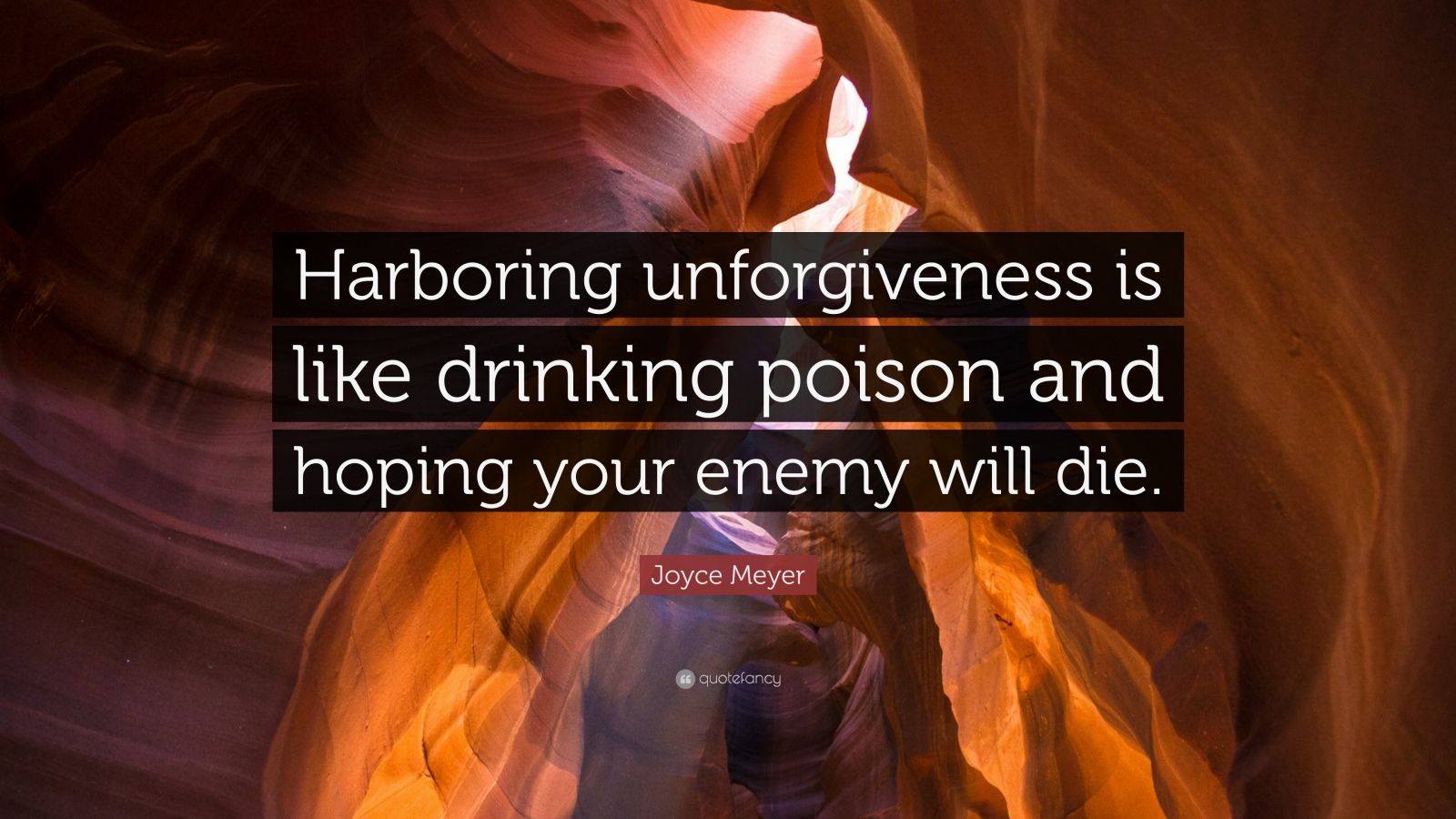Dealing with Unforgiveness
To deal with unforgiveness, we must go to the Word of God to see how God tells us to deal with the sin of unforgiveness.
Dealing With Unforgiveness
 Taking on an offense
Taking on an offense
Unforgiveness is a subject that everyone has to deal with from time to time. We all have different personalitities, and occasionally, certain people in our lives rub on us like sandpaper. Then, there are other times when someone has deeply hurt us - intentionally or even unintentionally. The point is, these are deep wounds that need to be tended to before they fester and cause irreparable damage to you and often the other person or party. How we respond to that offense determines whether we live under blessings or cursings, or even life or death. Therefore, having a biblical understand of forgiveness is critical to our life.
The Bible's way toward forgiveness
God has instructed His people how to deal with unforgiveness to where it will help you AND the one or ones whom you hold an offense. The Bible gives us instruction on how to take unforgiveness and turn it around to forgiveness. When someone has wronged you, especially if it is a brother or sister in the Lord, there are biblical steps to take. This is even good advise if the person or persons you are dealing with are not Christians as well.
Matt 18:15-17 "If your brother sins against you, go and show him his fault, just between the two of you. If he listens to you, you have won your brother over. 16 But if he will not listen, take one or two others along, so that `every matter may be established by the testimony of two or three witnesses.' 17 If he refuses to listen to them, tell it to the church; and if he refuses to listen even to the church, treat him as you would a pagan or a tax collector. NIV
If someone has hurt you, you owe it to yourself to gently confront that person on their wrong behavior. If they do not listen to what you have to say, and many times they wont, there is a next step. Take someone else along with you that may be of help - a bipartisan party. Again, if they still refuse to listen to you, you may need to walk away, but in doing so, you have to make some decisions within yourself as to how you will handle that rejection. Either way, you must forgive that person or persons and respond to that rejection in a godly manner. Just realize, no matter how that person or persons respond to you, just the act of confrontation will help you. (2 Cor.10:15, Phil. 4:8)
The consequences of unforgiveness

If you do not forgive, here are some of the consequences that will happen on the inside of you.
- You will live with the hate and bitterness of what he or she or they did to you.
- You will live and replay the action of what they did or said over and over again in your mind.
- Your mind actually plans out revenge, and that is extremely destructive.
Did you know that 85% of all illnesses are stressed induced? Anger and bitterness are a part of that. Bitterness eats away like a cancer. We can't afford bitterness in our lives.
Scenarios in unforgiveness
- They may be times in unforgiveness that the person that angered you isn't even aware of what they did to you. You stewed in your anger, and they go on with their lives and don't have the slightest idea that you are angry with them. You have to deal with that to be set free.
- Then there are times when you confront the person or persons and you discover there was a lot of miscommunication that went on. You can then work through the miscommunication to free yourself of any unforgiveness.
- Then there may be times when confronting the situation that caused the unforgiveness would cause more damage, and through prayer you believe confrontation should not happen. You must still forgive and work through your emotions in a healthy biblical manner.
- Many times you can actually hold the other person(s) in a bondage - in shackles of unforgiveness; however, you end up in a greater bondage than they are with your anger or hatred toward them. It's like living in a prison with a lifetime sentence.
- In all situationd and under all circumstances, there are negative consequences. Regardless, we are still required to forgive.
Forgiveness is a choice to live a free life.
The natural thing to do when someone offends us is to get upset. Feelings of anger, betrayal, or even revenge, as well as a lot of other negative emotions come to the surface. Even worse, trying to bury our feelings, pretending they are not there is far worse. It is bad for our health - physically, emotionally, and spiritually. Negative emotions can consume our thoughts and become a stumbling block to our happiness, our prayer life, moving on, and causes a wedge between us and the person we feel did the offense.
To settle how to handle an offense, we must go to the Word of God to see how God wants to direct us (Matt. 18:15-18).
Gentle confrontation
In an effort to restore the relationship between you and the one you feel offended you, you must choose to go to that person lovingly, and gently confront him or her. You have a biblical obligation before God to do so as long as you are able, unless the offense was so severe to where it would be dangerous to do so.
Several things could result with such a confrontation.
- As you "quietly" dialog, you may discover that the offense was more in your head than being a reality, and restoration comes, bringing you two back together again.
- Or maybe the other person sincerely apologizes and the two of you are restored. Praise the Lord. The incident is over!
- Or, you may discover that you had a part in the offense, which then you need to take responsibility to apologize and do what you can to restore that relationship.
- But then, maybe restoration did not happen, and things either did not change, or they got worse. That is the risk that you take when you confront.
If restoration did not happen, or it was impossible or unwise to go to that person, what do you do now? Or what if that pain was so deep that reconciliation is impossible. You still have to forgive. As a Christian, you again go to the Word of God to see what God says on handling this situation. As you search the Scriptures, you find scripture upon scripture of the necessity of forgiving others. You know this is something you have to do. But that still doesn’t take care of the pain that is going on inside you.
Our minds are like computers

Our minds are like computers and that offense is now programmed inside your mind. When offenses bring on pain, whether it is physical, emotional, or spiritual pain, it is impossible to dismiss it. The old saying "forgive and forget" can never happen because God created our minds to remember things in life. While remembering what happened will always be filed somewhere in our mind, the pain of the incident can leave as long as you go through the "ACT" of forgiveness. (See below) At that point, the incident of the offense will have been dealt with and it will no longer carry the importance that it once did in your life. The pain will be gone and it will seem like it is forgotten because it no longer takes a priority in your life.
Sadly, for those who do not deal biblically with unforgiveness, the offense can affect them physically, emotionally, or even spiritually for the rest of their life. That must never happen - especially for Christians.
The "ACT" of Forgiveness
To begin the "ACT" of forgiveness, it begins by "choosing" to forgive. It has absolutely nothing to do with feelings, but it is a willingness to be obedient to God's Word. Those "feelings" of forgiveness will absolutely come to pass as you are obedient to go through the "ACT" of forgiveness. Whether the person you need to forgive changes or not is not even the issue.
When you choose to forgive, you need to verbally speak out to the Lord that you forgive that person or persons. Say his or her name(s) as you speak (Lord, I choose to forgive __________________). Speak it out loud. This is the beginning of ACTING out forgiveness. You see, when you speak it out, you hear it with your own ears. What you hear with your ears eventually drops down in your heart. Do this over and over - every time those negative feelings comes to your mind. Either way, eventually the miracle of the "feeling" of forgiveness will come to you. Just as faith comes by hearing and hearing, as well as speaking and speaking, so does the "feeling" of forgiveness come by the repetitive action of the heart. When healing finally drops down in your heart, you will know it. The pain of it will be gone! There may be a time as the healing of forgiveness takes place when the Lord may direct you to go to that person to say you forgive them. If He does, He will give you the strength to do so. (Mark 11:23b)
The "Train of Forgiveness"
Because the act of forgiveness is a choice, it therefore requires an action on our part. We cannot rely on our feelings, but choose, as an act of our will, to begin the process of forgiveness - yes, the PROCESS of forgiveness. Imagine the ACT of forgiveness is like a train. You have an engine, with boxcars, flatbeds, passenger cars, and other various cars with a caboose at the end. The engine becomes our choice in the act of forgiveness. All the cars that make up the train consist of our many emotions and experiences that make up the unforgiveness that we deal with. It ends with the caboose. The engine drives the train, pulling all of the cars, including the caboose. Treat the engine as your act of choice as you begin the process of forgiveness.

The "ACT" of Reconciliation







